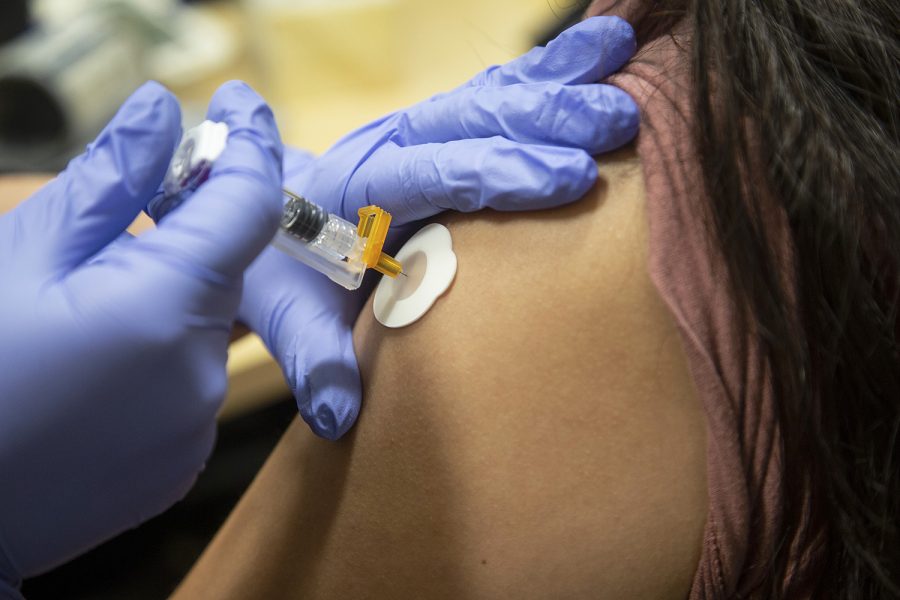University of Iowa to pause Johnson & Johnson vaccinations amid CDC recommendations
After reports of a severe blood clot syndrome appearing in six individuals who have taken the Johnson & Johnson vaccine in the U.S., the CDC and FDA issued a statement recommending pausing vaccinations until research and data are analyzed
Photo Illustration by Katie Goodale
April 13, 2021
The University of Iowa is pausing all Johnson & Johnson vaccinations for students and staff until further notice following recommendations from the Centers for Disease Control and Prevention and the Food and Drug Administration.
The CDC and FDA issued a joint statement on Tuesday recommending the pause of all Johnson & Johnson vaccine distribution after reports of a rare but serious side effect from the vaccine.
Out of 6.8 million people who have received the vaccine, there have been six reported cases of severe blood clots in individuals. According to Director of UI Student Health Paul Natvig, the individuals were women ages 18 to 48, and symptoms developed within six to 13 days of vaccination.
Natvig said in a video to the UI community that while it is common to experience flu-like symptoms after receiving the vaccine, individuals experiencing severe headaches, abdominal pain, leg pain, or shortness of breath, should contact their health care provider.
Pat Winokur, executive dean of the UI Carver College of Medicine, told reporters on Tuesday that the appearance of this blood clotting syndrome is rare, but pulling the Johnson & Johnson vaccine for the time being is the right decision.
“This (pausing the vaccine) is what should happen. These one in a million events, we can’t pick up until a drug or vaccine is distributed out into the public,” Winokur said. “The fact that we caught these is actually telling us that our system is working.”
COVID-19 predisposes people to blood clotting, but the potential instances of clotting from the virus resembles a common clot that shows normal levels of platelets, Winokur said. The platelet count decreases significantly in the blood syndrome connected to the Johnson & Johnson vaccine, she said, which makes it more severe.
Clots from this blood syndrome are unusual and found deep in the brain and stomach in this syndrome, she added, but it is unclear at this time if the vaccine is the cause of these clots.
“Any time we have a really rare side effect, we’re always balancing what would happen in natural circumstances without being exposed to the vaccine,” she said. “People get sick every day of the year, whether they got a vaccine or not. And when you have these very rare events, it’s hard to understand, is it just that it was April 12 when this developed, and it had nothing to do with the vaccine, or is it enriched in those weeks following the vaccine. That’s what we need to learn.”
Winokur said the university will be canceling all scheduled appointments for the Johnson & Johnson vaccine, and students will receive an email to notify them of the cancellation. Students and staff who have already received the Johnson & Johnson vaccine will receive a letter outlining the pause in the vaccine distribution and asking individuals to watch out for severe symptoms.
The Iowa Department of Public Health said in a statement on Tuesday that it was informed that the Johnson & Johnson vaccine allocation to the state will be suspended for two weeks. The state is recommending all Johnson & Johnson vaccination processes in the state should halt until further notice from the CDC, and has communicated this to local health officials and vaccine providers in the state, the release said.
The state will work with local health officials and vaccine providers to substitute Moderna and Pfizer vaccines where Johnson & Johnson vaccines have been allocated. The release said since the Johnson & Johnson vaccine represents a relatively small percentage of the allocation Iowa has received to date, this pause is not anticipated to dramatically slow the pace of vaccinations in the state.
When asked whether the Johnson & Johnson vaccine should have been released later after more evaluation, Winokur said a delay in vaccine release would not have allowed medical professionals to detect this side effect.
“Though this was evaluated quickly, we would not have seen this in any vaccine produced slowly,” she said. “We had to use a lot of doses. As you get into large numbers, we start to see these rare events. This is why we follow all newly approved drugs so closely.”
In Iowa, 83,685 doses of the Johnson & Johnson vaccine have been distributed, with 2,388 doses given in Johnson County.
RELATED: University of Iowa begins vaccine scheduling for students
The Daily Iowan previously reported that the UI would receive a supply of Johnson & Johnson vaccines to allocate to students and staff. On April 2, the university sent out a survey for students to take and express interest in setting up an appointment time to receive the vaccine.
The week of April 9 marked the end of the first week where the UI was vaccinating recently eligible students that had used the survey to schedule an appointment for the Johnson & Johnson vaccine. The UI was relying on the Johnson & Johnson vaccine to vaccinate most students by the end of the spring 2021 semester.
Lisa James, spokesperson for UI Student Health, told the DI that over the course of last week, the UI had distributed 425 of 500 doses given by the state, and the university would receive a total of 1,000 doses of the Johnson & Johnson vaccine.
The next shipment of Johnson & Johnson vaccines from the state was to arrive Tuesday, but it is unclear if the UI will receive that shipment.
Winokur said despite this delay in the Johnson & Johnson vaccination process, production of vaccines is ramping up, and UI Health Care is expecting more doses of Pfizer and Moderna vaccines, both two-shot doses compared to Johnson & Johnson’s one-shot dose.
According to Winokur, there have been no reports of blood clots from those who have taken the Pfizer and Moderna vaccines. When asked about the threshold for pulling a vaccine, and the chances of Pfizer and Moderna being pulled, Winokur said the CDC and FDA has always been analyzing the question of the risk/benefit. No severe effects have been observed in the hundreds of millions of doses that have been administered worldwide to date, Winokur said.
“We have a pandemic, we know people are dying, we know we have variants being spread that spread more readily that do perhaps have a higher risk for mortality,” Winokur said. “So that’s the risk/benefit ratio that you have to evaluate, and that’s what the FDA, CDC, and ACIP have been trained to do, is trying to understand the risks versus the benefits.”















